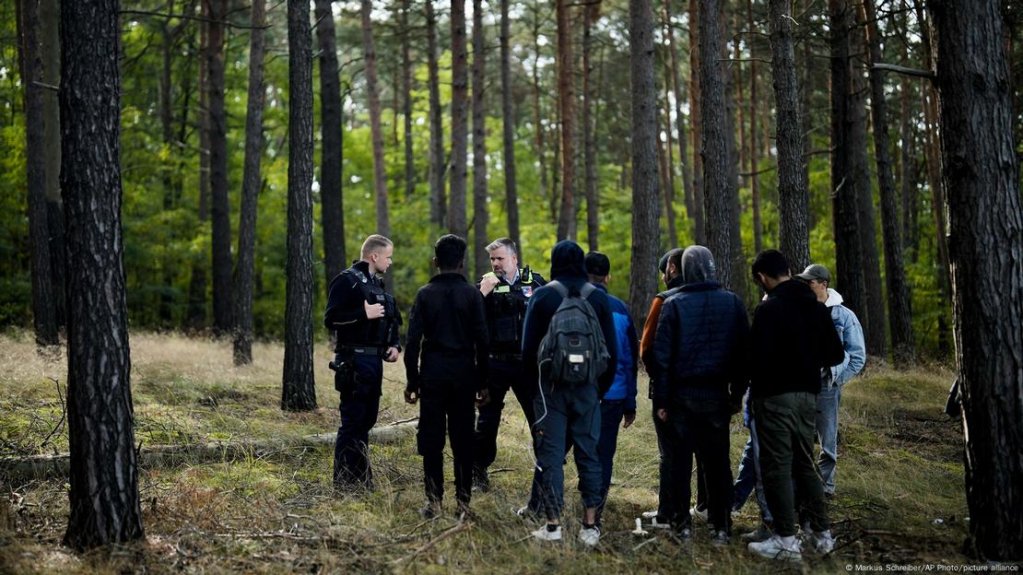The EU is to boost spending on surveillance at its borders with Russia and Belarus. The move is intended to stop the two countries sending migrants over the borders in what the EU says is 'hybrid warfare'.
The European Commission said on Wednesday that Poland, Finland, Estonia, Latvia, Lithuania, and Norway would receive an additional 170 million euros "to upgrade electronic surveillance equipment, improve telecommunication networks, deploy mobile detection equipment and counter drone intrusions."
The president of the European Commission, Ursula von der Leyen, announced the funding package on the social media platform X, after talks with Finland’s prime minister, Petteri Orpo. She praised Finland, Poland, Norway and the Baltic countries for "bravely keeping our borders safe from threats of all forms coming from Russia and Belarus."
The EU executive’s new vice-president in charge of security, Henna Virkkunen, said the situation at Europe’s borders was "very serious".
"Russia uses weaponization of migration as a new tool in the war against the EU. We must not allow any hostile state to abuse European values, including the right to asylum," she said.
Russia and Belarus are accused of facilitating the movement of migrants from the Middle East, South Asia and Africa to cross into Europe via Finland, Poland, Latvia and Lithuania. The EU calls this "hybrid warfare", with migrants used as weapons against the West. Both Russia and Belarus deny the accusations.
Read AlsoPoland cites Finnish example while elaborating its new migration strategy

Restricting asylum rights and defining pushbacks
In addition to the announcement of funding for further security at the borders, the Commission said EU countries would be allowed to temporarily suspend a migrant’s request for international protection "in exceptional circumstances."
Virkkunen said the freeze should only be used "when the weaponization is posing security threats for member states and exceptional measures are needed." She added that the conditions for restricting access to asylum would be "very strict. … They have to be truly exceptional, temporary, proportionate and for clearly defined cases."
The Commission also underlined that member states must "respect fundamental rights and the principle of non-refoulement."
Under international law, pushing migrants back across the border is still prohibited. When Euractiv, an independent European media network, asked Virkkunen whether denying the right to asylum was different from a "pushback", she replied that all measures must be taken according to EU law.
Read AlsoNew EU migration policies expected to get even tougher in 2025
NGOs highlight abuse of migrants
The need for the EU to respond to hybrid attacks and the instrumentalization of migrants is outlined in the EU Pact on Migration and Asylum. It is also one of the express duties of the new EU Commissioners Virkkunen and the Commissioner for Internal Affairs and Migration, Magnus Brunner.
Human rights organizations are critical of the EU’s approach, which focuses on strengthening borders and increasing surveillance. The concept of hybrid warfare has already been invoked by member states "to push people back and shirk international obligations at the Poland-Belarus border and more recently at the Finland-Russia border," said PICUM, a network of human rights and refugee NGOs.
Poland began fortifying its border with Belarus in 2021, constructing wire fences and imposing a state of emergency in an attempt to stop migrants from crossing irregularly into the EU. Belarus' president, Alexander Lukashenko, was accused by the West of intentionally luring people from the Middle East to Minsk and promising them unrestricted passage into the EU via the Polish border.

Thousands of migrants have crossed the border since the crisis began, in spite of the tighter border security measures. Many have complained of extreme brutality and human rights abuses by authorities, including on the Polish side.
In a report published this week, Human Rights Watch said that violent pushbacks of asylum seekers were continuing at the border between Poland and Belarus. The group accused Polish authorities of actions that "fly in the face of its duties under national and EU law and basic humanity," and urged Poland to guarantee migrants trying to enter the country from Belarus access to the asylum procedure.
With Reuters, AP
